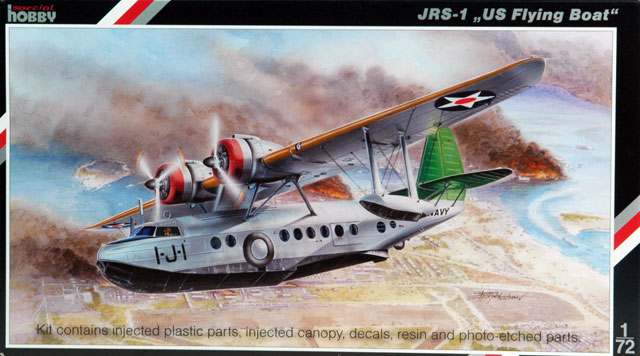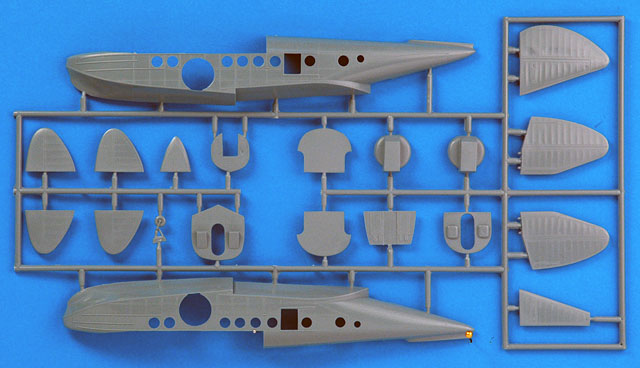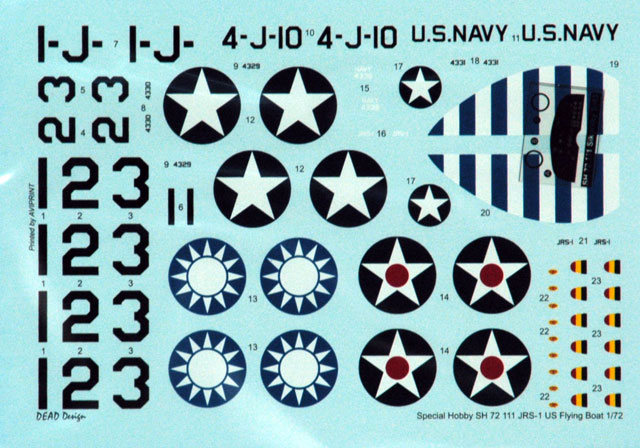|
JRS-1 "Baby Clipper"
US Flying Boat

Special Hobby, 1/72 scale
S u m m a r y
|
|
Catalogue Number: |
Special Hobby No
SH72111 - Sikorsky JRS-1 “Baby Clipper” |
|
Scale: |
1/72 |
| Contents and
Media: |
114
mid grey plastic parts on four sprues, 23 clear parts on one
sprue, 27 resin parts on five casting blocks, 25 + PE parts
on one fret plus a 16 page instruction booklet with history,
parts plan, 10 pages of build diagrams and 3 pages of
paint/decal drawings. |
| Price: |
USD$39.96 from Squadron.com |
| Review Type: |
FirstLook |
| Advantages: |
An attractive looking
flying boat from a period many modellers are interested in
plus all the usual MPM advantages. |
| Disadvantages: |
Although the clear
parts are injection moulded, they are not quite as clear as
we've become used to from MPM. |
|
Recommendation: |
Highly Recommended |
Reviewed by Glen Porter

Special
Hobby's 1/72 scale JRS-1 "Baby Clipper" is available online from
Squadron.com
Designed and built by Sikorsky in
1935 as a scaled down version of the four engined S-42 Clipper, the two
engined S-43 was known as the Baby Clipper and deployed to South America
as a supplement to the S-42. The US Navy and Marines bought 17 of these
boats under the designation of JRA-1 and used them as Utility Transport
Aircraft through out WWII.
While doing research for this review, looking, among other places, at
Seawings web site, I discovered that this very kit has previously been
released by Sword. Not just the same aircraft but apparently the same
kit. Scans of the Sword sprues on Seawings appear to be exactly the same
as these. Now, I've got several Sword kits and, as good as they are,
they are usually not as good as this so I have to conclude that the
original kit was moulded for them by MPM. As far as I can see, this kit
varies only in the decals and box art.
So, let's see what's in the box...

Click the thumbnails below to view larger images:
Actually, before we open it, I
must mention something about the box itself. Instead of the usual flimsy
side-opening box, this time we have a sturdy affair with a separate lid.
You could pile ten to twenty kits on top of this and it wouldn't crush.
This, I believe, is something the other European manufacturers should
take note of.
The box, the box, what's in the box! Sorry. There are five plastic
sprues, one clear and the others mid-grey. All cleanly moulded with very
little flash, small attachment points and excellent detail. The first
has the two fuselage halves, fin/rudder, tale-plane, wing-tips,
bulk-heads, etc. The next comes with the main-plane upper and lower,
floats, cowlings, wing support and inner and outer wheel halves. Then
comes floor, props, wing support struts, multi-piece under-carriage legs
and other small odds and sods. The last of the four grey sprues is a bit
of an oddity. It's the top of the fuselage, from the rear of the canopy
to just behind the wing support in two halves. I'm not sure why they've
done this as I doubt you would want to fit the interior after joining
the fuselage halves. Thats certainly 'not' how it's shown in the
instructions. The clear sprue is not as clear as I would like but I
think a coat of Future or the like would fix things.
Resin parts are nicely cast and detailed but there aren't as many as you
might expect for a model this size. Two radial engines, of cause, crew
and passenger seats, exhausts and carburetor intakes, and some other
small exterior bits.
Lots of PE bits, too many for my liking, but most modellers will rub
their hands together. Fortunately for me, many of the PE parts are
duplicated in plastic or resin.
The decals, the decals. Beautiful decals. Printed by Aviprint, there are
markings for five aircraft, three from Pearl on the 7th of December
1941, (1-J-1, 2 and 3), in pre-war colours, one from VJ-1, US Navy 1942,
location unknown, in Blue-Grey and Light-Grey and the fifth, bought by
the Chinese Government for madam Chiang Kai-Shek in worn Dark Green and
Silver. All the decals have good register, colour density and minimum
carrier film as we've come to expect from Aviprint.

The instruction booklet is as usual from Special Hobby with good clear
build diagrams but some of the PE parts in the instructions are
mislabeled as PUR, which means resin, so care will have to be taken to
study the diagrams before building.
Looking somewhat like a scaled-down Catalina, this is a very attractive
aircraft and being an amphibian, one doesn't have to worry about
beaching trolleys or the like. With those pre-war colours, this is
another kit that I'm itching to get into.
Highly Recommended.
Thanks to MPM/Special Hobby for the review sample.
Review Text Copyright © 2006 by Glen Porter
Images Copyright © 2006 by Brett Green
Page Created 10 April, 2006
Last updated 09 April, 2006
Back to HyperScale Main Page
Back to Reviews Page
|
Home | What's
New | Features
| Gallery |
Reviews | Reference
| Forum
| Search